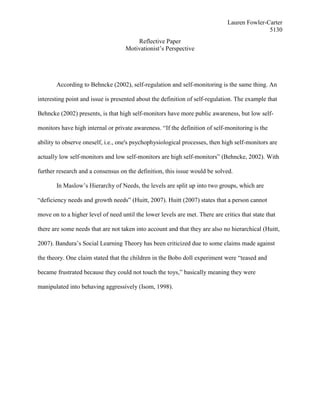Unit Five Reflective Paper
- 1. Lauren Fowler-Carter 5130 Reflective Paper MotivationistˇŻs Perspective According to Behncke (2002), self-regulation and self-monitoring is the same thing. An interesting point and issue is presented about the definition of self-regulation. The example that Behncke (2002) presents, is that high self-monitors have more public awareness, but low self- monitors have high internal or private awareness. ˇ°If the definition of self-monitoring is the ability to observe oneself, i.e., one's psychophysiological processes, then high self-monitors are actually low self-monitors and low self-monitors are high self-monitorsˇ± (Behncke, 2002). With further research and a consensus on the definition, this issue would be solved. In MaslowˇŻs Hierarchy of Needs, the levels are split up into two groups, which are ˇ°deficiency needs and growth needsˇ± (Huitt, 2007). Huitt (2007) states that a person cannot move on to a higher level of need until the lower levels are met. There are critics that state that there are some needs that are not taken into account and that they are also no hierarchical (Huitt, 2007). BanduraˇŻs Social Learning Theory has been criticized due to some claims made against the theory. One claim stated that the children in the Bobo doll experiment were ˇ°teased and became frustrated because they could not touch the toys,ˇ± basically meaning they were manipulated into behaving aggressively (Isom, 1998).
- 2. Lauren Fowler-Carter 5130 References Behncke, L. (2002). Self-Regulation: A Brief Review. Retrieved November 2, 2011, from Athletic Insight: http://www.athleticinsight.com/Vol4Iss1/SelfRegulation.htm Huitt, W. (2007). Maslow's HIerarchy of Needs. Retrieved October 26, 2011, from Educational Psychology Interactive: http://www.edpsycinteractive.org/topics/conation/maslow.html Isom, M. D. (1998, November 30). Albert Bandura. Retrieved October 26, 2011, from Florida State University: http://criminology.fsu.edu/crimtheory/bandura.htm


